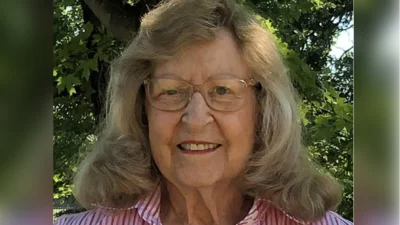Celina Villanueva, State Senator 12th District (D) | https://www.ilga.gov/senate/Senator.asp?GA=103&MemberID=3167
Celina Villanueva, State Senator 12th District (D) | https://www.ilga.gov/senate/Senator.asp?GA=103&MemberID=3167
According to the Illinois General Assembly site, the legislature summarized the bill's official text as follows: "Amends the Mental Health and Developmental Disabilities Administrative Act. Requires the Department of Human Services to establish reimbursement rates that build toward livable wages for front-line personnel in residential and day programs and service coordination agencies serving persons with intellectual and developmental disabilities. Provides that for community-based providers serving persons with intellectual or developmental disabilities, subject to federal approval, the rates taking effect for services delivered on or after July 1, 2025 shall be increased sufficiently to: (i) provide a minimum $2.00 per hour wage increase over the wages in effect on June 30, 2025 for front-line personnel; and (ii) provide wages for all other residential non-executive direct care staff, excluding direct support professionals, at the U.S. Department of Labor's average wage as defined, by rule, by the Department. Amends the Illinois Public Aid Code. Provides that for ID/DD facilities and MC/DD facilities, the rates taking effect for services delivered on or after July 1, 2025, shall be increased sufficiently to: (i) provide a minimum $2.00 per hour wage increase over the wages in effect on June 30, 2025 for front-line personnel; and (ii) provide wages for all other residential non-executive direct care staff, excluding direct support professionals, at the U.S. Department of Labor's average wage as defined, by rule, by the Department. Requires the same increase for front-line personnel employed at community-based providers serving persons with intellectual or developmental disabilities. Amends the Illinois Administrative Procedure Act. Grants the Departments of Human Services and Healthcare and Family Services emergency rulemaking authority. Effective immediately."
The following is our breakdown, based on the actual bill text, and may include interpretation to clarify its provisions.
In essence, this bill, effective immediately, mandates that the Illinois Department of Human Services and Department of Healthcare and Family Services establish reimbursement rates to ensure living wages for front-line personnel in facilities serving individuals with intellectual and developmental disabilities. From July 1, 2025, rates will be increased to provide a minimum $2 increase per hour for front-line staff compared to wages on June 30, 2025. Additionally, wages for other non-executive direct care staff, excluding direct support professionals, should align with the U.S. Department of Labor's Bureau of Labor Statistics' average wage. The bill also authorizes emergency rulemaking to facilitate these changes.
Celina Villanueva has proposed another four bills since the beginning of the 104th session.
Villanueva graduated from the University of Illinois at Urbana-Champaign in 2008 with a BA.
Celina Villanueva is currently serving in the Illinois State Senate, representing the state's 12th Senate District. She replaced previous state senator Steven Landek in 2023.
Bills in Illinois follow a multi-step legislative process, beginning with introduction in either the House or Senate, followed by committee review, floor debates, and votes in both chambers before reaching the governor for approval or veto. The General Assembly operates on a biennial schedule, and while typically thousands of bills are introduced each session, only a fraction successfully pass through the process to become law.
You can read more about bills and other measures here.
| Bill Number | Date Introduced | Short Description |
|---|---|---|
| SB1617 | 02/04/2025 | Amends the Mental Health and Developmental Disabilities Administrative Act. Requires the Department of Human Services to establish reimbursement rates that build toward livable wages for front-line personnel in residential and day programs and service coordination agencies serving persons with intellectual and developmental disabilities. Provides that for community-based providers serving persons with intellectual or developmental disabilities, subject to federal approval, the rates taking effect for services delivered on or after July 1, 2025 shall be increased sufficiently to: (i) provide a minimum $2.00 per hour wage increase over the wages in effect on June 30, 2025 for front-line personnel; and (ii) provide wages for all other residential non-executive direct care staff, excluding direct support professionals, at the U.S. Department of Labor's average wage as defined, by rule, by the Department. Amends the Illinois Public Aid Code. Provides that for ID/DD facilities and MC/DD facilities, the rates taking effect for services delivered on or after July 1, 2025, shall be increased sufficiently to: (i) provide a minimum $2.00 per hour wage increase over the wages in effect on June 30, 2025 for front-line personnel; and (ii) provide wages for all other residential non-executive direct care staff, excluding direct support professionals, at the U.S. Department of Labor's average wage as defined, by rule, by the Department. Requires the same increase for front-line personnel employed at community-based providers serving persons with intellectual or developmental disabilities. Amends the Illinois Administrative Procedure Act. Grants the Departments of Human Services and Healthcare and Family Services emergency rulemaking authority. Effective immediately. |
| SB1618 | 02/04/2025 | Amends the Liquor Control Act of 1934. Creates a distillery shipper's license, a class 3 craft distiller license, and a spirits showcase permit. Provides that a class 3 craft distiller license, which may be issued to a distiller or a non-resident dealer, shall allow the manufacture of no more than 100,000 gallons of spirits per year and shall allow the sale of spirits from the class 3 craft distiller's in-state or out-of-state class 3 craft distillery premises to retail licensees, class 3 brewers, and class 3 craft distillers as long as the class 3 craft distiller licensee meets certain requirements. Authorizes a class 3 craft distiller to self-distribute subject to certain requirements and limitations. Provides that a distillery shipper's license shall allow a person with an Illinois distiller license, a craft distiller license, a class 1 craft distiller license, a class 2 craft distiller license, or a class 3 craft distiller license or who is licensed to make spirits under the laws of another state to ship spirits directly to a resident of this State who is 21 years of age or older for that resident's personal use and not for resale. Provides that a spirits showcase permit shall allow an Illinois-licensed distributor to transfer a portion of its spirits inventory from its licensed premises to the premises specified in the spirits showcase permit license; in the case of a class 3 craft distiller, to transfer only spirits the class 3 craft distiller manufactures from its licensed premises to the premises specified in the spirits showcase permit license; and to sell or offer for sale at retail, only in the premises specified in the spirits showcase permit license, the transferred or delivered spirits for on or off premises consumption, but not for resale in any form and to sell to non-licensees not more than 156 fluid ounces of spirits per person. Sets forth provisions concerning licensure application; fees; recordkeeping; and shipping and delivery of spirits. Preempts home rule powers. Makes conforming and other changes. |
| SB1307 | 01/28/2025 | Amends the Environmental Protection Act. Requires the Environmental Protection Agency to annually review and update the underlying data for, and use of, indicators used to determine whether a community is designated as an environmental justice community and to establish a process by which communities not designated as environmental justice communities may petition for such a designation. Provides that an applicant for a permit for the construction of a new source that will become a major source subject to the Clean Air Act Permit Program to be located in an environmental justice community or a new source that has or will require a federally enforceable State operating permit and that will be located in an environmental justice community must conduct a public meeting prior to submission of the permit application and must submit with the permit application an environmental justice assessment identifying the potential environmental and health impacts to the area associated with the proposed project. Provides requirements for the environmental justice assessment. Contains provisions regarding public participation requirements for permitting transactions in an environmental justice community. Provides that, if the Agency grants a permit to construct, modify, or operate a facility that emits air pollutants and is classified as a minor source, a third party may petition the Pollution Control Board for a hearing to contest the issuance of the permit. Contains provisions regarding environmental justice grievances. Defines terms. Contains other provisions. |
| SB0120 | 01/17/2025 | Amends the Illinois Act on the Aging. In provisions concerning the Community Care Program, provides that, subject to federal approval, on and after January 1, 2026, rates for in-home services shall be increased to $32.75 to sustain a minimum wage of $20 per hour for direct service workers. As a condition of their eligibility for the $32.75 in-home services rate, requires in-home services providers to (i) certify to the Department on Aging that they remain in compliance with the mandated wage increase for direct service workers and (ii) submit cost reports. Provides that fringe benefits shall not be reduced in relation to the rate increases. Provides that beginning January 1, 2028, the Department shall ensure that each in-home service provider spends a minimum of 80% of total payments the provider receives for homecare aide services it furnishes under the Community Care Program on total compensation for direct service workers who furnish those services. Requires the Department to adopt rules on financial reporting and minimum direct service worker costs. Authorizes the Department to sanction a provider that fails to meet the requirements of the amendatory Act. Defines terms. |
| SB0144 | 01/17/2025 | Amends the School Code. Prohibits a charter from being granted to an organization that operates a private, parochial, or non-public school or child care facility. Provides that a charter school shall spend no less than 90% of its budget on direct-service costs for students. Removes provisions regarding the closure of charter schools, the use of unspent public funds, and the procedures for disposition of property and assets. Requires the governing body of a charter school that is the subject of a school action to work collaboratively with local school educators and families of students attending the charter school to ensure successful integration of affected students into new learning environments. Requires, for a charter school closure, the governing body of the charter school to ensure that all students of the charter school at the time of the closure will be guaranteed a seat at a receiving school and that all teachers of the charter school at the time of the closure will be guaranteed a job at a receiving school. Sets forth requirements for school transition plans. Requires the governing body of the charter school to designate at least 3 opportunities for public comment at a hearing or meeting on the proposed school action. |






 Alerts Sign-up
Alerts Sign-up